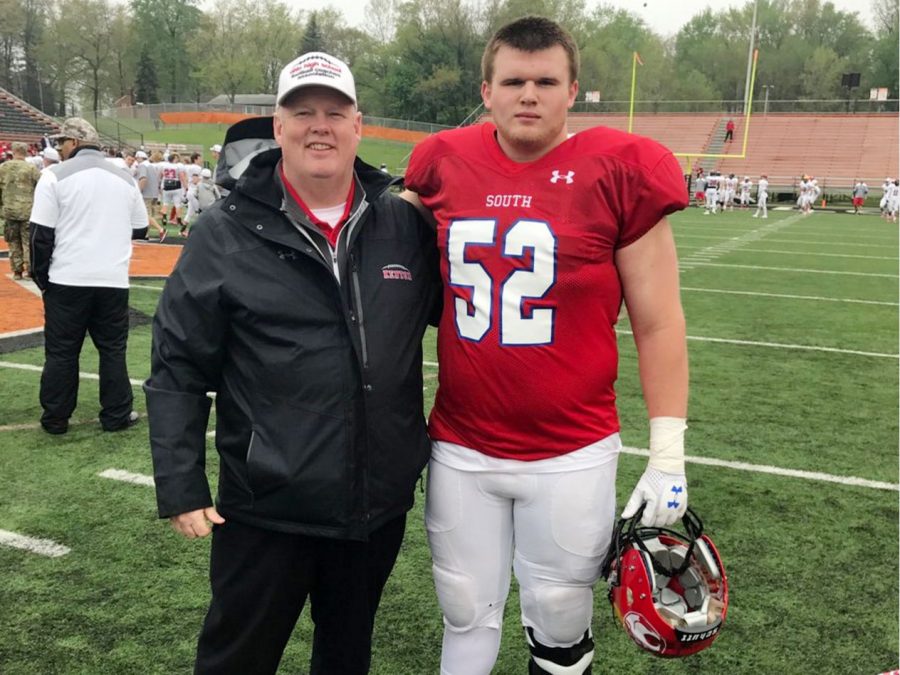Fired strength coach lacked proper certification; job application says otherwise
Tyler Heintz, right, died after a morning workout with the Kent State football team June 13. Heat was likely a factor in the death, according to the Portage County coroner.
September 6, 2017
Ross Bowsher, the former Kent State football strength and conditioning coach supervising the June 13 practice where football player Tyler Heintz died, said on his job application in 2015 he was nationally certified.
Kent State released a statement Aug. 14 announcing Bowsher’s dismissal after an internal review found he provided false information about his certification. The statement also said the university’s review found the workout was conducted “in accordance with national protocols for student-athlete health and safety, and the session was supervised appropriately by qualified personnel.”
KentWired obtained a copy of the form and Bowsher’s resume through a public records request.
A question on the 15-page document Bowsher submitted when he applied for the strength coach position asked, “Are you certified as a Strength and Conditioning Specialist (CSCS) from the National Strength and Conditioning Association?”
Bowsher checked the “yes” box.
Heintz, a freshman offensive lineman, collapsed on the second day of summer workouts. The preliminary cause of death was hyperthermia, according to the Portage County coroner’s office. A final cause of death and autopsy report are pending.
In a statement on August 17, Bowsher said he was “disappointed” the university said the workout was conducted professionally at the same time it said he was dismissed for not being certified. Five certified personnel were also present at the workout, according to the university’s statement.
“This statement has led some to suggest that my involvement in the June 13 workout somehow contributed to Tyler Heintz’s death, which is absolutely untrue,” Bowsher said.
He also said, “The university has always been fully aware of my credentials. I’ve always been transparent with officials at Kent State University regarding my extensive education and experience that have allowed me to successfully coach collegiate athletes for the last 11 years.”
Bowsher declined to comment through his spokesperson about which officials at the university were aware of his certification.
NCAA bylaw 11.5 states a strength coach “must maintain current certification through a nationally accredited strength and conditioning certification program.”
When asked who was in charge of hiring Bowsher, university spokesperson Eric Mansfield said, “Kent State does not comment on personnel matters.”
Bowsher, who applied for the position in January 2015, also said on his application and his resume he was a professional member of the Collegiate Strength and Conditioning Coaches Association (CSCCa) and that he completed the 18-Credit Hour National Strength and Conditioning Association (NSCA) Certified Strength and Conditioning program.
Both Bowsher’s application and his resume say he sat for the “Master Strength Coach Exam” in May 2016, calling it the highest honor in the profession and that it requires 12 years of college strength and conditioning experience. The resume does not say if he passed the test or not.
Chuck Stiggins, executive director of the CSCCa, verified Bowsher is not certified through his agency. Bowsher also lacks NSCA qualifications. In response to an enquiry from Kent State’s Bob Lemieux, the assistant athletic director for sports performance, Scott Caulfield of the NSCA wrote in an email he couldn’t “find anything on Ross Bowsher so it looks like he has never been certified with us.” Caulfield encouraged Lemieux to officially request Bowsher’s standing with the association.
Bowsher previously worked at Butler University, Purdue University and Arkansas Tech University.
When contacted to comment about the contents of his job application and resume, Bowsher’s spokesperson directed KentWired to his original statement.
Henry Palattella is the sports editor. Contact him at [email protected].












